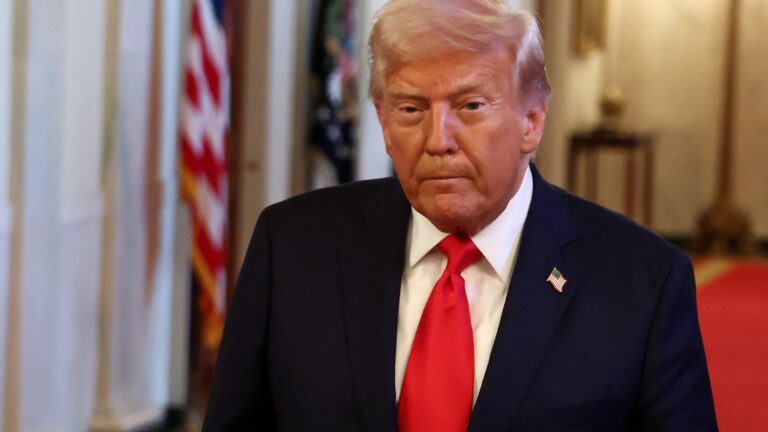
The Guard Escort of Salvadoran Jail was excluded by the alleged members of the gang train de Argu in Venezuela and the MS -13 gang recently exile by the US government to imprison the imprisonment center of terrorism (CECOT) jail, as part of an agreement with the Salvadoron government in this handout image, March 31, 2025.
Presidency Press Secretary | Via
In early Saturday, the US Supreme Court barred the administration of President Donald Trump to exist in immigration detained by Venezuela’s men, as their lawyers said they were at anxious risk of compulsorily removal by Justice without judicial review.
“The government is directed to remove any member of prisoners from the United States until further order of this court,” Justice said in a brief, non -composed judgment.
Conservative Justice Clarence Thomas and Samuel Alto disintegrated by the decision in public, released ETs at 12:55 pm.
The lawyers of the American Civil Liberty Union filed an immediate request in several courts including the Supreme Court on Friday, after the report, immediate action was requested to take immediate action that some men were already loaded in buses and stated that they were to be deported.
ACLU stated that rapid development meant that the administration was designed to deport men using the 1798 law, historically employed only in war, without a realistic opportunity to remove them without a realistic opportunity – as the Supreme Court was required.
The White House did not immediately respond to the Supreme Court’s decision to comment on the decision.
The matter raises questions about the adherence to Trump’s administration for the limit set by the Supreme Court. This affects a significant confrontation between the government’s two coquet branches and potentially a full-constitutional crisis.
Last year, Trump was elected on the promise of tightening the migrants, a criminal gang from Venezuela jails, which called the 1798 Alien Enemy Act to rapidly exemption a criminal gang from Venezuela jails, which his administration lashed out by a terrorist group.
The President and his senior colleagues have claimed their executive power that they give them wide rights on immigration matters, testing the balance of power between the branches of the government.
Fight in many courts
During a hearing on Friday, a government lawyer said in a related case that he was unaware of the schemes by the Homeland Security Department to deport men on Friday, but could be exile on Saturday.
Trump won a win on Friday when an appeal court posed a threat to the allegations of contempt by District Judge James Boseberg.
Boasberg also denied the ACLU request to block the TREN de Aragua’s suspected members, which allowed Trump to use the Act of foreign enemies, citing the Supreme Court’s decision on 7 April, which is with some limitations.
Boseberg said he was worried that the government would soon deport additional people as Saturday, but “I don’t think I do not think I have the power to do anything about it.”
Trump called for Boseberg’s impeachment after an adverse decision, leaving a rare rebuke from American Chief Justice John Roberts.
While a hearing was played at the court of Boseberg, ACLU worked on a separate track to prevent Venezuela’s exile in Texas.
ACLU lawyers filed with the Supreme Court, which was filed to block any such exile after the fifth US Circuit Court of appeal at American District Judge James Hendrix and New Orleans at the US District Judge James Hendrix and New Orleans.
In Saturday’s order, the Supreme Court invited the administration to file a response to ACLU’s request after the 5th Circuit Acts.
ACLU stated that men were handed over to the forms that show that they were classified as members of Train de Argua.
On the issue whether the Trump administration has completed the process of providing prisoners before sending the Supreme Court standard to another country – possibly in the notorious jail in Al Salvador where others are in jail.
It was not clear how many people could be deported on Friday, and where could they be taken.
How much notice is sufficient?
Their exile would be the first after the Supreme Court’s 5-4 decision, which allowed the removal under the law of 1798, while specifying that the notice should be “within a reasonable time and in such a way and would allow to seek a really appropriate location in the appropriate site before such expulsion.”
The Habs Corpus Relief referred to the rights of prisoners to challenge the validity of its custody. It is considered a basis under American law.
The Supreme Court did not indicate how much notice should be provided. Lawyers across the country have asked that 30 days notice is given to the migrants so that they can get permission to fight their exile. The Trump administration has not publicly said how much notice is the intention to give to the migrants.
ACLU filed a picture of one of the notice with the court.
“You have been determined to be a foreign enemy theme for apprehension, restraint and removal,” read the notice. The recipient’s name was unclear, and it was noted that the migrants refused to sign it on Friday.
When asked about the exile employed on Friday, Trump said he was unfamiliar with a particular case, but he said: “If they are bad people, I will definitely authorize it.”
“That’s why I was chosen. A judge was not elected,” he told reporters at the White House.
Defense lawyers and Democrats at the Congress pressurize the administration to demonstrate how it knows that Venezuela people are gang members who are active in human trafficking and other crimes in South America, but have a small American presence.
“We are not going to reveal the details of counter terrorism operations, but we are following the Supreme Court’s decision,” said the Assistant Secretary of the US Homeland Security Trissia McLaglin on Friday.
On 15 March, the Trump administration deported more than 130 alleged train de Argua members to Al Salvador. Many lawyers and family members of the migrants say they were not members of the gang and had no chance to dispute the government’s claim.



